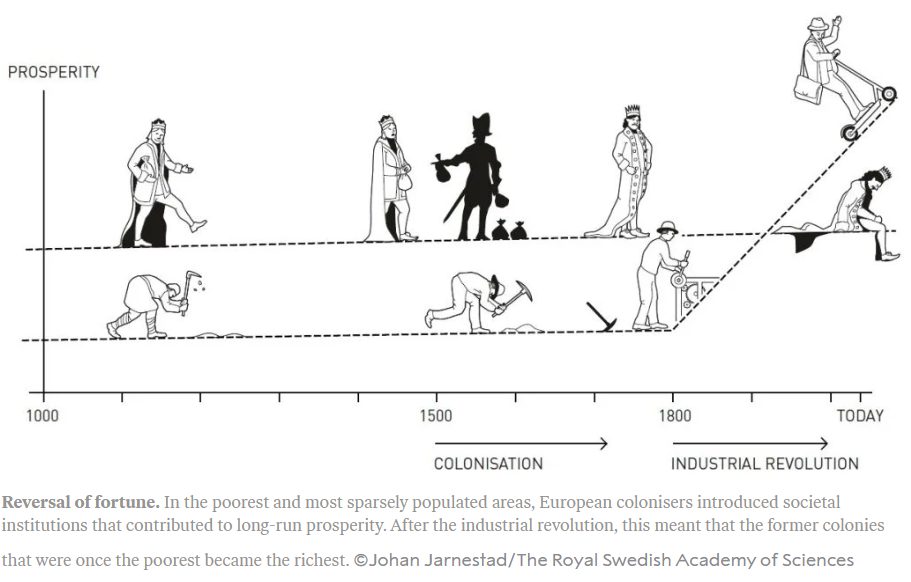A Nobel for explaining why nations fail
(Source – The Hindu, International Edition – Page No. – 10)
| Topic: GS3 – Economy |
| Context |
| ● The 2024 Nobel Prize in Economics was awarded to Daron Acemoglu, Simon Johnson, and James A. Robinson for their work on the role of institutions in economic prosperity.
● Their research highlights how inclusive institutions contribute to long-term growth, while extractive institutions lead to poverty. ● This recognition emphasises the importance of institutional quality in economic development. |
Understanding Economic Disparities
- The question of why some countries are rich and others are poor has puzzled economists for a long time.
- Currently, the richest 20% of countries have an average income that is 30 times greater than that of the poorest 20%.
- Since the Industrial Revolution caused a significant gap in living standards between the East and West, various theories have emerged to explain these differences.
Theories Behind Economic Success
- Some theories attribute wealth in the West to the effects of colonialism, while others cite disparities in natural resources.
- Some scholars even suggest that intelligence or random historical events could determine a nation’s economic fate.
Importance of Institutions
- Acemoglu, Johnson, and Robinson argue that the quality of economic and political institutions is the main factor explaining the economic outcomes of countries.
- This idea is extensively detailed in their 2012 book, Why Nations Fail: The Origins of Power, Prosperity, and Poverty, and their 2004 paper, “Institutions as a Fundamental Cause of Long-Run Growth.”
- Institutions that protect property rights encourage hard work, leading to economic growth, while those that permit expropriation can cause stagnation.
Types of Institutions
- The Nobel laureates categorise institutions as either “inclusive” or “extractive.”
- Inclusive institutions promote secure property rights and democracy, while extractive institutions are characterised by insecurity and lack of political freedom.
- They demonstrated that inclusive institutions foster long-term economic growth, whereas extractive ones result in poverty.
Historical Context of Institutions

- The researchers studied how colonisation influenced the types of institutions established in different regions.
- In areas where colonists were unwilling to settle due to high mortality risks, extractive institutions were created, leading to long-term economic challenges.
- In contrast, colonists who settled aimed to establish inclusive institutions that supported investment and economic growth, as seen in the U.S.
Challenges in Implementing Inclusive Institutions
- The Nobel laureates explored why more countries have not adopted inclusive institutions.
- They argue that rulers may prefer extractive institutions that allow for personal gain, thereby resisting reforms that would benefit the broader population.
- These extractive institutions can persist until there is a significant threat of rebellion, prompting some rulers to create more inclusive systems to promote growth.
| PYQ: COVID-19 pandemic accelerated class inequalities and poverty in India. Comment. (150 words/10m) (UPSC CSE (M) GS-1 2020) |
| Practice Question: Discuss the significance of inclusive institutions in fostering economic prosperity, as highlighted by the 2024 Nobel laureates in Economics. Analyse the factors that hinder the establishment of such institutions in various countries. (250 Words /15 marks) |
